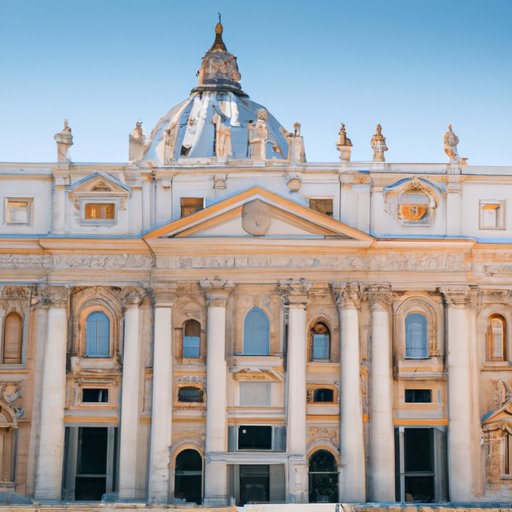
Introduction
The Vatican is the smallest sovereign state in the world and is home to the head of the Roman Catholic Church, the Pope. In addition to its religious significance, the Vatican also holds great financial importance due to its vast wealth and assets. In this article, we will investigate how much money the Vatican has, including its sources of income and expenditures. We will also explore the historical evolution of its financial system, compare it to other religious institutions and sovereign states, examine controversies surrounding its finances, and discuss potential future outlooks. The purpose of this article is to provide a comprehensive overview of the Vatican’s economic situation and emphasize the importance of transparency and ethical financial practices in religious institutions.
Investigative Approach
The Vatican’s financial assets are often shrouded in secrecy, but estimates suggest that it has wealth in the billions of dollars. The Vatican’s sources of income include donations from Catholics all over the world, investments in stocks and real estate, and revenue from its own commercial activities, such as tourism and publishing. In addition, the Vatican has a large investment fund managed by the Institute for the Works of Religion (IOR), also known as the Vatican Bank.
Despite its vast wealth, the Vatican is known for its conservative spending habits. Much of its expenses go towards maintaining its historic buildings and supporting religious activities. The Vatican employs around 4,000 people, including cardinals, priests, and administrative staff.
The Vatican’s financial system operates differently from other sovereign states. It does not levy taxes and instead relies on donations and investments. The Pope serves as the ultimate authority in financial matters, with the Secretariat for the Economy serving as a watchdog. In recent years, efforts have been made to increase transparency, with the IOR undergoing significant reforms and the Vatican’s financial statements being audited by an independent firm.
Historical Approach
The Vatican’s financial system has a long and complex history. In the 19th century, the Papal States, which included most of central Italy, were a significant source of revenue for the Catholic Church. However, after the Italian unification in 1870, the Papal States were dissolved and the Vatican was left in a precarious financial situation. To remedy this, the Vatican signed the Lateran Treaty with Italy in 1929, which recognized the Vatican City as an independent state and granted it compensation for the loss of the Papal States.
The Vatican’s financial situation has also played a significant role in its political history. During World War II, the Vatican worked to protect Jews and other persecuted groups, and used its financial resources to help refugees and prisoners of war. In the years following the war, the Vatican played a critical role in the post-war European recovery, providing aid to countries in need. More recently, the Vatican’s economic influence has extended to issues such as climate change and global poverty.
Comparison Approach
Compared to other religious institutions and sovereign states, the Vatican’s financial situation and assets are difficult to determine. However, it is estimated that the Catholic Church as a whole is one of the wealthiest institutions in the world, with real estate holdings, investments, and other assets worth an estimated $30 billion or more. When compared to other sovereign states, the Vatican’s wealth is relatively modest, with a GDP of around $2 billion. However, the Vatican’s global influence and standing as a religious institution give it significant economic and political power.
Controversy Approach
The Vatican’s finances have been the subject of controversy in recent years. In 2010, the IOR came under investigation for alleged money laundering. The Vatican has since undertaken significant reforms to its financial system to prevent such incidents from occurring. Additionally, there have been accusations of tax evasion and corruption within the Vatican, leading to calls for increased transparency and accountability.
Despite these controversies, the Vatican has responded with a commitment to financial transparency and accountability. The IOR has undergone major reforms, and the Vatican has taken steps to provide more detailed financial information, including appointing an independent auditor. The Vatican also cooperates with international organizations to combat money laundering and terrorist financing.
Future Outlook Approach
The Vatican’s financial situation is likely to be impacted by future economic conditions, including changes in global investment patterns and the ongoing COVID-19 pandemic. To maintain financial stability, the Vatican has emphasized the importance of responsible investing and has sought to diversify its revenue streams. Additionally, the Vatican has introduced measures to increase transparency and financial accountability.
In the long term, the Vatican will also need to consider its financial sustainability. This may involve reassessing its spending habits or seeking new sources of revenue. Ultimately, the Vatican’s financial outlook will have significant implications not only for the Catholic Church but also for the wider global community that it serves.
Conclusion
As we have seen, the Vatican’s financial situation is complex and difficult to unravel. While estimates suggest that its wealth is vast, the Vatican has responded with a commitment to transparency and ethical financial practices. As a religious institution with immense political and economic power, the Vatican must continue to prioritize responsible investing and financial accountability. Only with transparency and ethical practices can the Vatican maintain its standing and continue to serve its followers in a responsible and sustainable way.





